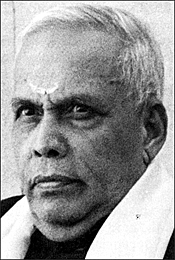|
The Pioneers: S. R. Ranganathan D.
J. Foskett
Introduction: With the exception of Melvil Dewey, there is probably no librarian as
widely known and universally admired as Shiyali Ramamrita Ranganathan, whose birth centennial falls in
1992. TWL is pleased to offer in his honor an appreciation of his pioneering accomplishments, written
by a man who knew him and participated in the advancement of his ideas. —G.A.M.

 |
Shiyali Ramamrita Ranganathan,
Courtesy of American Libraries |
It is safe to say that no single individual has made quite such a wide-ranging contribution to the development
of library and information services in his own country as S. R. Ranganathan. Internationally, he is probably
best known for his revolutionary theories on bibliographical classification, and for his work with IFLA and
FID; but in India, he brought a scientific approach to every facet of professional work.
He has recorded how he early began to search for normative principles, and how an intellectual struggle
was resolved by an illuminating comment by Professor Edward J. Ross one evening-"You mean, 'Books are
for use.'" From this principle, which Ranganathan named a Law of Library Science, he deduced the other
four Laws, and these formed the guide to action which he pursued single-mindedly all his life, often at
the sacrifice of family and other personal relationships.
From being a teacher of mathematics, he accepted the post of University Librarian at Madras, and immediately
set about improving the service to the students and faculty. It was this urge to make the library more
useful that prompted the invention of the Colon Classification and a similar codification of cataloguing
practice in Classified Catalogue Code (1934). These two, with Five Laws of Library Science,
began the series published by the Madras Library Association, but perhaps the next volume, Library
Administration (1935), illustrates best his remarkable ability to analyse practice in the most minute
detail in order to produce an instructional manual which could be a bench book for even the least educated
assistant. Thus the first, and possibly the most fundamental contribution he made to Indian librarianship,
was to publish basic texts for the education of future professionals.
After his travels abroad, he became intensely irritated by the apparent backwardness of his country's libraries,
in particular by the lack of facilities for the poorer sections of the community, who had as much right
to books and information as the richer. He soon realised that the surest way forward was to persuade the
national and the states' governments to enforce action. To this end, he drafted model library legislation
which, though by no means universally adopted or even welcomed, nevertheless succeeded in bringing the
need for such action to the attention of a wide audience, including politicians. As a Brahmin and a former
university teacher, he also had valuable contacts in high places.
His visit to England in 1948, the first in his regular series of international travels, brought him face
to face with the emerging role of LIS in support of science and technology, particularly in industry,
and he immediately appreciated the need for India also to advance its traditional techniques into the
area of documentation and its facets, and organised a symposium on this need for an Indian response, published
in 1963. He often found an illuminating phrase, like "spotting out microdocuments," an apt way to describe
the action usually ponderously called selective dissemination of information. Again, he saw that a national
model was required, and played an important role in establishing INSDOC, one of the pioneer national organisations
devoted to the control of the growing flood of scientific and technical documents, in the interest of
the nation as a whole.
Long after his official retirement, he continued to fill important posts, as university librarian, and as
professor at the Documentation Research and Training Centre in Bangalore, where he founded and led a school
which continues to this day to produce a stream of well trained and qualified professionals to serve in
LIS across the country.
Ranganathan came to librarianship in a country struggling to break free from a colonial past, subsequently
fraught with the problems of success and the pursuit of a democratic future. His aim, carried out with
an iron determination which brooked no opposition, was to assert the absolute necessity of an advanced
LIS for the future of India, and to bring into his profession the best of modern trends and methods seen
in his wide travels-in VINITI in Moscow as well as in London or Pittsburgh. But he was insistent that
mere borrowing is not the best way to put this information to use; cultural imperialism is no better than
old colonialism. His way was a constant analysis and codification of the details of the best professional
practice in a never-ending search for fundamental principles as a guide to action. Applied in an appropriate
manner, such principles would ensure that Indian LIS would rank with the best in the world, and contribute
in a unique and systematic way to its forward progress.
About the Author
D. J. Foskett retired in 1983 from the position of Director, Central Library Services, University
of London. He had been Librarian of the University of London Institute of Education, and had also worked
as a public librarian and special librarian. Mr. Foskett has been active in the Library Association (President,
1976), and was one of the founders of the Classification Research Group. His wide international experience
includes numerous missions for Unesco and the British Council in most parts of the world. He has taught
at the Universities of Michigan, Ghana, Ibadan, and Iceland, and at the Brazilian Institute of Bibliography
and Documentation. The latest of his numerous books is Pathways to Communication (1984).
© 1991 D. J. Foskett
Top of Page | Table of Contents
|

